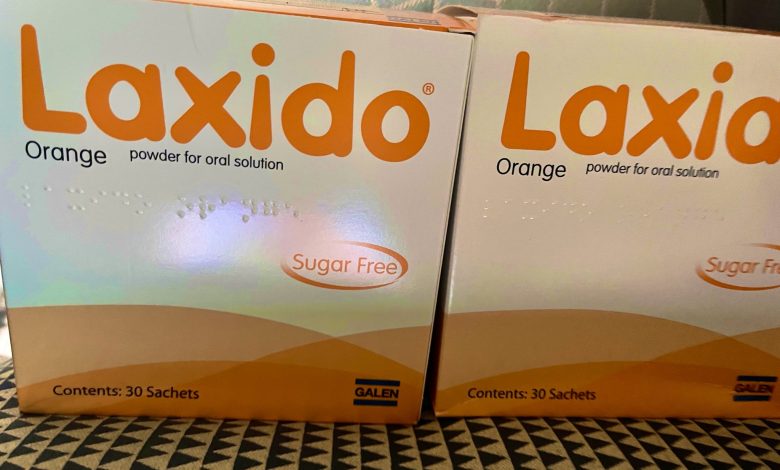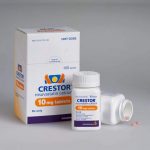Laxido: Uses, Dosage, How it Works, Side Effects, Interactions, FAQs

What Laxido Orange is and what it is used for
Laxido Orange is a medication that combines macrogol 3350 with electrolytes such as sodium chloride, sodium hydrogen carbonate, and potassium chloride. The primary active ingredient, macrogol 3350, serves as a laxative and is specifically designed to address constipation-related issues. This laxative is particularly effective for individuals who have been constipated for an extended period.
Laxido Orange is also used in the treatment of faecal impaction, a condition characterized by the accumulation of hard faeces in the bowel resulting from prolonged constipation. By incorporating macrogol 3350, this medication works by softening the faeces, facilitating easier passage, and providing relief from the discomfort associated with constipation.
In addition to macrogol 3350, Laxido Orange contains electrolytes—sodium chloride, sodium hydrogen carbonate, and potassium chloride. These electrolytes play a crucial role in maintaining the body’s normal levels of sodium, potassium, and water during the treatment of constipation. The balanced presence of these electrolytes helps ensure that the body’s essential functions are not compromised while addressing constipation-related issues. This comprehensive approach in Laxido Orange, combining a laxative with electrolytes, underscores its efficacy in providing relief from both short-term constipation and the complications arising from prolonged bowel irregularities.
Laxido Orange offers a dual-action solution, leveraging the softening effects of macrogol 3350 to alleviate constipation symptoms while simultaneously maintaining the body’s electrolyte balance through the inclusion of sodium chloride, sodium hydrogen carbonate, and potassium chloride. This combination makes it a versatile medication for individuals experiencing various degrees of constipation and related complications.
What you need to know before you take Laxido Orange
Before taking Laxido Orange, it is essential to be aware of specific precautions and contraindications. Do not proceed with Laxido Orange if any of the following conditions apply:
• Allergic (hypersensitive) reactions to macrogol 3350, sodium chloride, sodium hydrogen carbonate, potassium chloride, or any other ingredients in this medicine.
• Presence of a perforation in the wall of your intestine.
• Existence of a blockage in your intestine.
• Experience paralysis of the intestine, such as when your intestines cease to function due to intestinal surgery or severe infection.
• Diagnosis of ulcerative colitis, Crohn’s disease, or toxic megacolon.
If any of these conditions are relevant to your medical history, it is strongly advised to consult with your doctor, pharmacist, or nurse before proceeding further. Seeking their guidance will provide you with tailored advice and may involve exploring alternative options to ensure your safety and well-being.
How to Take Laxido Orange
Ensure that you take Laxido Orange precisely as instructed in this leaflet or as advised by your doctor, pharmacist, or nurse. It is an orally administered laxative designed for the treatment of constipation and faecal impaction in adults, children (aged 12 years and above), and the elderly.
Dosage Guidelines:
• For Constipation: The typical dose for constipation is one sachet taken one to three times daily.
• For Faecal Impaction: The usual dose is eight sachets daily, all taken within a six-hour period. If you have a heart condition, refrain from taking more than two sachets (in 250ml of water) in any one hour.
Mixing Instructions: Laxido Orange should be prepared by dissolving the contents of one sachet in a glass of water (125ml or a quarter pint). Stir thoroughly until all the powder dissolves. If treating faecal impaction, the contents of all eight sachets can be dissolved together in a large container (in one litre of water).
Duration of Treatment:
• For Constipation: Typically, the course of treatment does not extend beyond 2 weeks. If ongoing constipation persists or is related to a specific disease or medication, your doctor may adjust your dose accordingly.
• For Faecal Impaction: The course usually lasts no longer than 3 days.
If You Take More or Forget to Take Laxido Orange:
• Excessive intake may lead to severe abdominal pain, swelling, vomiting, or diarrhea, potentially causing dehydration. In such cases, cease Laxido Orange and increase fluid intake. Consult your doctor or pharmacist if concerned.
• If a dose is forgotten, take it as soon as remembered; do not double the dose.
Discontinuation and Follow-up: To maximize the benefits, complete the recommended course of treatment. Contact your doctor if symptoms worsen or fail to improve after 14 days for chronic constipation or after 3 days for faecal impaction.
Pregnancy and Breast-feeding: Laxido Orange is deemed safe for use during pregnancy and while breast-feeding. However, if you are pregnant, breast-feeding, suspect you may be pregnant, or are planning to conceive, it is prudent to seek advice from your doctor or pharmacist before initiating this medication.
Driving and Machine Operation: Laxido Orange does not impact the ability to drive or operate machinery. Users can engage in these activities without concern about impairment.
Potassium and Sodium Content: Each sachet of Laxido Orange contains 0.68mmol (26mg) of potassium. If you consume more than one sachet daily and have compromised kidney function or follow a controlled potassium diet, this should be taken into consideration. Additionally, the medicine contains 187mg of sodium per sachet, equivalent to approximately 9% of the recommended maximum daily dietary intake for an adult. If you require three or more sachets daily for an extended period, especially if you are advised to follow a low-salt (sodium) diet, consult your doctor or pharmacist.
How long does Laxido take to work?
The onset of action for Laxido (or Laxido Orange) can vary from person to person. It typically starts working within 1 to 2 days, but some individuals may experience relief sooner, while others may take a bit longer. The time it takes for Laxido to produce its laxative effects depends on various factors, including the severity of constipation, individual response to the medication, and overall health. It’s essential to follow the recommended dosage and instructions provided by your healthcare provider.
Should I take Laxido in the morning or at night?
The optimal time to take Laxido (or Laxido Orange) depends on individual preferences and lifestyle factors. Some individuals may prefer a morning dose to promote regular daytime bowel movements, while others may choose the evening or night to experience the laxative effects during sleep. Consistency in timing is key, and it’s advisable to establish a routine that aligns with your daily schedule. If you have specific health concerns or conditions, consulting with your healthcare provider is recommended for personalized guidance on the most suitable timing for your Laxido intake.
Possible Side Effects
As with any medication, taking Laxido Orange may lead to side effects, though not everyone experiences them. Should you encounter any of the following side effects, cease taking Laxido Orange and promptly consult your doctor:
• Serious Allergic Reactions: Immediate medical attention is warranted if you observe signs of a severe allergic reaction, such as difficulty breathing, or swelling of the face, lips, tongue, or throat.
• Allergic Symptoms: If you notice manifestations of an allergy, such as a rash, skin reddening, hives, itching, or shortness of breath, discontinue use and seek medical advice.
• Fluid or Electrolyte Level Changes: Report any signs of alterations in your body’s fluid or electrolyte levels, including swelling (especially in the ankles), fatigue, dehydration, or increased thirst accompanied by headaches. These symptoms could indicate abnormal potassium levels in your blood.
Additionally, the following side effects are also possible:
• Abdominal pain
• Feeling bloated
• Wind (flatulence)
• Indigestion
• Soreness of the anus (bottom)
• Mild diarrhea
• Nausea
• Vomiting
• Abdominal swelling
• Stomach rumbling
Should you experience any side effects, it is crucial to communicate with your doctor, pharmacist, or nurse.
What should I do if I experience abdominal pain while taking Laxido Orange?
Abdominal pain is a possible side effect. If it persists or becomes severe, consult your doctor.
How long should I take Laxido Orange for constipation or faecal impaction?
The course of treatment for constipation typically does not exceed 2 weeks. For faecal impaction, the course usually lasts no longer than 3 days. Follow your doctor’s recommendations.
Can I take Laxido Orange if I have kidney issues or follow a low-salt diet?
If you have reduced kidney function or are on a controlled potassium diet, consult your doctor. Laxido Orange contains potassium and sodium, and considerations should be made if taking more than one sachet daily.
Medications to avoid while taking Laxido Orange
Laxido Orange, which contains macrogol 3350 and electrolytes, is generally considered safe. However, it’s crucial to be aware of potential interactions with other medications. Always consult with your doctor or pharmacist before starting any new medication or making changes to your existing medication regimen. Here are some medications to avoid while taking Laxido :
- Oral Medications: Laxido Orange may interfere with the absorption of certain orally administered medications. It’s advisable to take other medications at least 2 hours before or after taking Laxido Orange.
- Lithium: Laxatives, including those containing macrogol, can affect the absorption and elimination of lithium, a medication often used to treat bipolar disorder. If you are taking lithium, your doctor will monitor your lithium levels closely when using Laxido.
- Oral Antibiotics: If you are taking oral antibiotics, it’s recommended to separate the timing of Laxido Orange and the antibiotic dose to avoid potential interactions.
- Medications with Narrow Therapeutic Index: Some medications with a narrow therapeutic index, where small changes in dose or blood concentration may lead to severe effects, might be affected by concurrent use of laxatives. Consult your doctor if you are on such medications.
- Medications for Heart Conditions: Individuals with heart conditions should be cautious, as Laxido Orange contains potassium. If you are taking medications that affect potassium levels (e.g., ACE inhibitors, potassium-sparing diuretics), your doctor may need to monitor your electrolyte levels closely.
Always inform your healthcare provider about all the medications, including over-the-counter drugs, herbal supplements, and vitamins, that you are currently taking. They can provide personalized advice based on your specific health situation.
How should Laxido Orange be stored?
Store unopened sachets below 25ºC. If a solution is prepared, cover and refrigerate (2°C to 8°C), using it within six hours. Do not use damaged sachets.





